This week marked Everest Day—a celebration of those who’ve stood on top of the world, and the rest of us who find our summit somewhere between two rivers in the Garhwal Himalayas. While I haven’t scaled Everest (yet!), I keep returning to the trails nestled between the Alaknanda and Mandakini rivers in Uttarakhand. These aren’t just routes on a map—they’re winding metaphors for life itself.
I’ve trekked paths where shepherds know more about weather than any app, and trails where you lose network, time, and occasionally your sense of direction—but somehow always find perspective. Whether it’s the mist rolling in from Kedarnath valley or the quiet resilience of a pine standing alone, these mountains gently remind you: you’re not here to conquer, but to listen.
And that’s the thing about aiming high. The ones who’ve never failed probably never dared anything big enough. In the Himalayas, there’s no such thing as a perfect plan. The trails are messy, maps are unreliable, and the weather unpredictable. You prepare, you adapt, you respect the mountain. Much like life—or business school. The mountains, whether literal or metaphorical, demand courage and humility. They strip away ego and leave you with clarity—and sore calves.
So, as we mark Everest Day and marvel at climbers doing record-breaking ascents (some even with xenon in their lungs), let’s remember the goal isn’t always the summit; it’s who you become along the way. Sometimes, it’s the serenity of a sunrise in a bugyal, the chatter at a teashop on the mule path to your next camp site , or the breath you catch after a steep push near another mountain ridge. Keep walking, keep climbing. The best views often follow the longest silences.
So here’s to all those chasing big dreams, whether you’re studying through the night, launching your startup, training for a marathon, or just trying to survive your Monday. Keep climbing. Even if you get lost, you just might find your way back—with a better story to tell.
DTW
During the Week, a team of four British climbers completed a remarkable feat—summiting Mount Everest and returning to London in under a week, a process that typically takes several weeks due to the need for acclimatization. Their success sparked intrigue when it was revealed they had inhaled xenon gas prior to the expedition, a substance with known effects on red blood cell production and neuroprotection. Xenon may increase erythropoietin (EPO), which enhances oxygen-carrying capacity—a critical advantage at high altitudes.
However, scientists remain skeptical about the extent of xenon’s impact. Although animal studies and limited human trials show a rise in EPO, actual improvements in athletic performance or high-altitude acclimatization remain unproven. Moreover, the climbers also used hypoxic tents for weeks—an established method to simulate high-altitude conditions and stimulate EPO naturally.
While xenon might have offered a marginal physiological boost, experts suggest that it was the climbers’ rigorous training and effective pre-acclimatization strategies that were the real heroes. Not the least, all four of them are ex-British Special Forces Veterans.
The British climbers’ record-breaking ascent of Mount Everest—possibly aided by xenon inhalation—offers a timely metaphor for how we approach technology like AI in our everyday lives. Just as xenon may have given these mountaineers a physiological edge in extreme conditions, AI offers knowledge workers, students, and creators powerful tools to boost performance, save time, and access previously unimaginable capabilities.
But this edge raises important questions: Where do we draw the line between fair augmentation and unfair advantage? Much like the debate around xenon—where experts are unsure whether its effects are meaningful or marginal—AI tools are often viewed with suspicion. Critics argue that AI can lead to dependency, diminish originality, or even replace human effort entirely. For example, AI-generated writing, code, or art is sometimes seen as “cheating,” bypassing the hard-earned skill-building that real learning and craftsmanship demand.
Yet, as with the climbers’ use of hypoxic tents and years of training, success in a tech-enabled world still hinges on human discipline, contextual understanding, and thoughtful application. AI, like xenon, can provide a boost—but it cannot replace experience, creativity, or perseverance.
The ethical use of AI, therefore, lies in transparency and intent. Are we using AI to replace effort, or to amplify it? Are we masking incompetence, or accelerating learning? Ultimately, the challenge is not about banning technological boosters, but about cultivating wisdom in their use. Whether climbing Everest or navigating life and work, tools—be it xenon or AI—should extend, not replace, our intrinsic human potential.
For young managers and MBA students stepping into a world reshaped by AI, the ethical use of technology isn’t just a theoretical debate—it’s a professional imperative. As future decision-makers, you will increasingly rely on AI tools for research, analysis, communication, and strategic thinking. But the core question remains: are you using AI to shortcut your responsibilities, or to deepen your understanding?
As always, intent matters. Use AI to accelerate your learning curve, not replace it. Let it help you explore patterns, draft first versions, or generate insights—but don’t let it numb your own judgment or curiosity.
Closer home, at the IBS Hyderabad Campus, the message was clear- Deeksharambh isn’t just an induction—it’s a mindset shift. It marks the beginning of a transformation where curiosity must meet commitment. One powerful lever students often overlook? Networks. The connections you already have—peers, faculty, alumni, and family—are not just sources of support, but of insight, feedback, and opportunity. Build relationships, not just contacts. But networking without consistency is like running without direction. It’s the disciplined pursuit of small, purposeful actions that compounds into results.
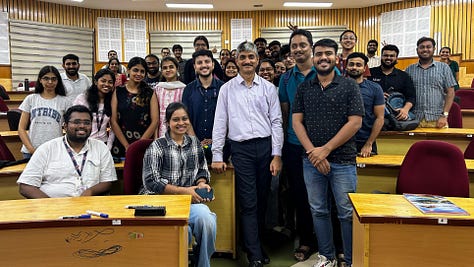
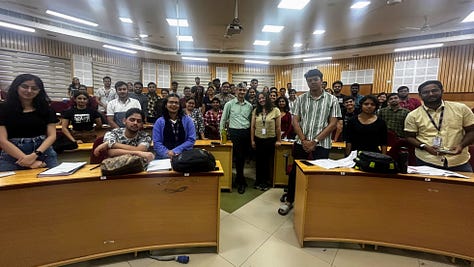
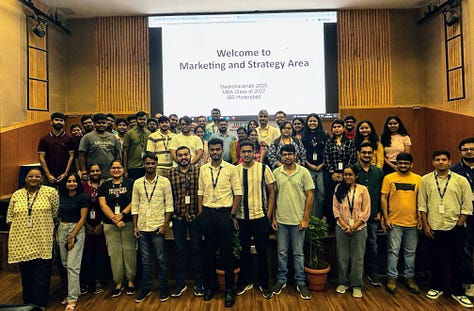

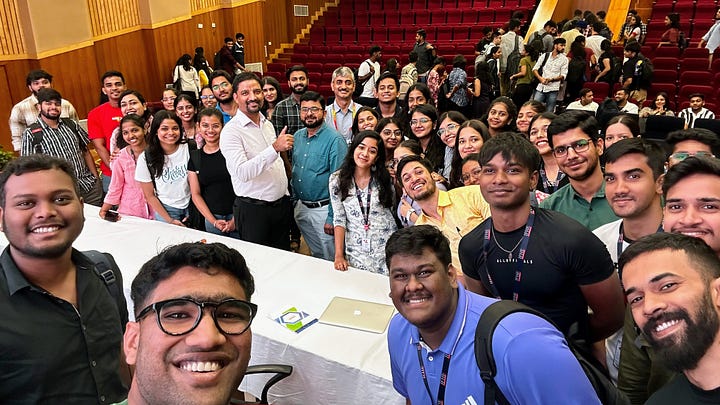
Join the conversation on LinkedIn.
So, here are my two cents for my students-
Success in the MBA isn’t about flashes of brilliance—it’s about showing up, every day, and doing the work. As with marathon training, progress is built on weeks of structured effort, not weekend sprints.
Read regularly. Reach out intentionally. Reflect deeply. Repeat.
So begin well. Engage wide.
And remember: Presence matters—right here, right now.
OTW
Over the Weekend, we attended reception for Shivani and Rohith and blessed the lovely couple. What a joy it was to celebrate the beautiful union of Shivani and Rohith! As we gathered to bless the couple, it was a deeply proud and emotional moment for the entire Payanam family and the Sunbeam Kids team. Many of us have had the privilege of watching Shivani blossom—from a quiet, curious teenager with a twinkle in her eye to a thoughtful, compassionate, and dedicated teacher who has touched so many young lives with grace and patience.
Her journey has been one of steady growth, quiet strength, and deep purpose. As she begins this new chapter with Rohith, we are filled with hope and happiness for the life they are building together. May their days be filled with laughter, understanding, and unwavering support for each other. May their love grow deeper with every shared dream, challenge, and milestone.



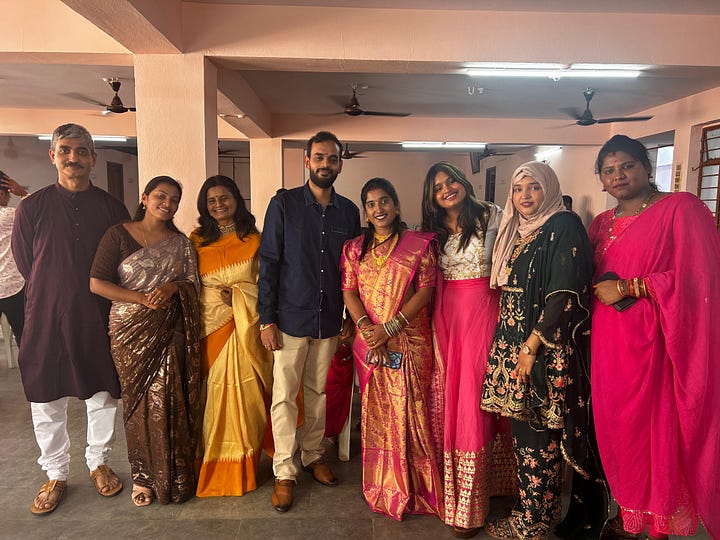
Shivani, you are a shining example of kindness and resilience. We wish you and Rohith a lifetime of love, joy, and good health. May your home be full of warmth, laughter, and beautiful memories. With all our hearts, we bless you on this new adventure. Here’s to love, light, and a journey even more magical than you imagined!
As the weekend comes to a close, there is flurry of messages from IBS Hyderabad MBA Class of 2026. Welcome back to campus, !
As you return for the final leg of your MBA journey, we are ready with careers preparation workshops and case studies in B2B Marketing, Managing Platform Businesses and Managing Digital Transformation courses. Looking forward to work once again with familiar faces over unfinished conversations, and renewed ambition.
Make the most of this last stretch. Strengthen your networks, sharpen your skills, and soak in every discussion, dilemma, and drama that life throws at you. The finish line is near—but so is the start of something extraordinary. Let’s go!
I Love You
Shailendra





Your session was the best one yet sir! Looking forward to more!
Insightful post sir! Many things to learn